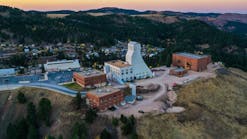Cowboy Clean Fuels Awarded $15M+ for RNG Production Using Sugar Beet Feedstocks and Coal Bed Methane Wells in Wyoming
Cowboy Clean Fuels (CCF), an energy technology company that permanently sequesters CO2 removed from the atmosphere and produces carbon-negative renewable natural gas (RNG) from agricultural byproducts, has received a total of $15.6 million in funding to support the commercialization of its technology and the build-out of its first commercial project in Wyoming’s Powder River Basin area.
CCF’s project – the Triangle Unit Renewable Energy and Carbon Capture and Storage (TRECCS) project – will utilize non-producing Coal Bed Methane (CBM) wells to permanently sequester CO2 and produce renewable methane at commercial levels.
CCF’s technology was developed by the company’s Co-Founder and Chief Technology Officer, Dr. Michael Urynowicez, Ph.D., at – and exclusively licensed from – the University of Wyoming’s Center for Biogenic Natural Gas Research.
According to the Wyoming Energy Authority, the CCF process starts with feedstock injection – specifically feed-grade byproducts of sugar beet refining. As the sugar beets grow, they remove CO2 and convert it into simple carbohydrates, like sugar.
By refining the beets into crystal sugar, CCF creates a feedstock that is directly injected into deep coal formations using the CBM wells. Once in the formation, methanogenic organisms convert the feedstock into methane and CO2.
When exposed to the hydrostatic pressure naturally existing in the formation, the CO2 is absorbed onto the coal surface and permanently sequestered, while the methane is delivered to the surface and brought to market.
Once operational, the project will sequester approximately 180,000 metric tons of CO2 per year and produce nearly 0.7 billion cubic feet of RNG annually.
The CBM industry has historically been a significant economic contributor to Wyoming, but it has entered an irreversible decline, rendering most of the $10 billion existing energy infrastructure and remaining CBM hydrocarbon resources uneconomical due to historically low natural gas prices.
CCF’s project has the potential to restore economic viability to the area’s energy infrastructure, bring jobs back to the region, and support local ranchers and landowners through mineral royalties payments, taxes, and surface rents.
If fully scaled, the TRECCS project could help Wyoming become the largest producing state for RNG and sequestered CO2, directly benefiting the state’s energy and agricultural industries, the state’s economy, and its citizens.
The $15.6 million in project funding is comprised of a $7.8 million award from the Wyoming Energy Authority’s Energy Matching Funds program and a second $7.8 million award in equity capital from Machan Investments.
“In our experience, the production levels possible on RNG and carbon sequestration are unparalleled in the current landscape and will position CCF for great commercial and technological success,” said Dan Dinges, Chairman of Machan Investment. “CCF is revitalizing non-economic Coal Bed Methane production equipment in the Powder River Basin, breathing new life into meaningful assets in Wyoming.”





